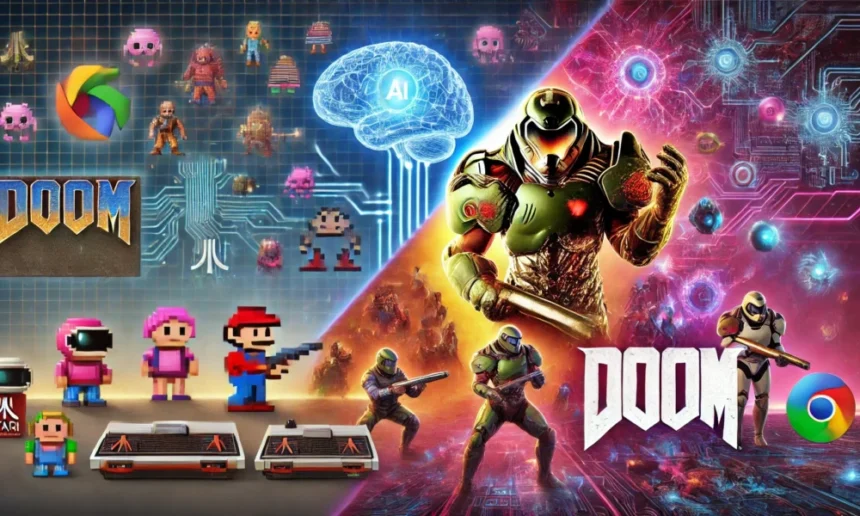The video game industry is currently worth $347 billion and has grown to be a significant player in the entertainment world, attracting over 3 billion people worldwide. Games began with simple titles like Pong and Space Invaders and evolved into more sophisticated games like Doom, which set a new standard in 3D visuals and console experiences. Today, the industry stands on the brink of a new era, influenced by advances in artificial intelligence (AI). Leading this transformation is Google, leveraging its vast resources and technology to redefine the way video games are made, played, and experienced. In this article, we explore Google’s journey to redefine video games.
The Beginnings: AI Playing Atari Games
Google’s use of AI in video games began with significant developments in creating AI that could perceive the game environment and react like a human player. In this early work, Google introduced deep reinforcement learning agents that could learn control strategies directly from gameplay. Central to this development was a convolutional neural network trained using Q-learning, which processes raw screen pixels and translates them into game-specific actions based on the current state.
The researchers applied the model to seven Atari 2600 games, without modifying the architecture or learning algorithm. The results were surprising: the model outperformed traditional methods in six games and exceeded human performance in three. This development highlights the potential for AI to process complex, interactive video games with only visual input.
This breakthrough laid the foundation for subsequent achievements, such as DeepMind’s AlphaGo beating the world Go champion. The AI agent’s success in mastering a difficult game spurred further research into real-world applications, including interactive systems and robotics. The impact of this development is still felt today in the fields of machine learning and AI.
AlphaStar: An AI that learns complex StarCraft II game strategies
Building on the success of its early AI, Google set its sights on a more complex challenge: StarCraft II. This real-time strategy game is known for its complexity, as players must control armies, manage resources, and execute strategies in real time. In 2019, Google unveiled AlphaStar, an AI agent capable of playing StarCraft II professionally.
AlphaStar was developed using a combination of deep reinforcement learning and imitation learning, first learning from watching replays of professional players, then improving through self-play and refining its strategy by running millions of matches. This work demonstrated the ability of an AI to handle complex real-time strategy games and achieve results comparable to human players.
Beyond individual games: Towards more general AI for games
Google’s latest advances mark a shift from mastering individual games to creating more versatile AI agents. Recently, Google researchers announced SIMA (short for Scalable Instructable Multiworld Agent), a new AI model designed to navigate different game environments using natural language instructions. Unlike previous models that required access to a game’s source code or custom APIs, SIMA works with just two inputs: an on-screen image and simple language commands.
SIMA translates these instructions into keyboard and mouse actions to control the game’s protagonist, allowing it to interact with a variety of virtual settings in a way that mimics human gameplay. Studies have shown that AI trained on multiple games outperform AI trained on a single match, highlighting the potential for SIMA to drive a new era of generalist or foundational AI for games.
Our ongoing efforts aim to expand SIMA’s capabilities and explore how to develop such versatile language-driven agents in diverse game environments, a development that represents an important step towards creating AI that can adapt and function in a variety of interactive contexts.
Generative AI for Game Design
Recently, Google has been broadening its focus from enhancing gameplay to developing tools to support game design. This shift is driven by advances in generative AI, particularly in image and video generation. One key advance is the use of AI to create adaptive non-player characters (NPCs) that react in more realistic and unpredictable ways to the player’s actions.
Additionally, Google has been exploring procedural content generation, where AI helps design levels, environments, and entire game worlds based on certain rules and patterns. This method streamlines development and gives players a unique, personalized experience every time they play, stimulating curiosity and anticipation. One notable example is Genie, a tool that allows users to design 2D video games by providing images and descriptions. This approach makes game development more accessible to people without programming skills.
Genie’s innovation lies in its ability to learn from diverse video footage of 2D platform games, rather than relying on explicit instructions or labeled data. This capability enables Genie to more effectively understand game mechanics, physics, and design elements. Users can start with a basic idea or sketch, and Genie will generate a complete game environment, including settings, characters, obstacles, and gameplay mechanics.
Generative AI for Game Development
Building on the progress made so far, Google recently announced its most ambitious project to date, a project that aims to simplify the complex and time-consuming game development process that traditionally required extensive coding and specialized skills. Recently, Google announced GameNGen, a generative AI tool designed to simplify the game development process. GameNGen allows developers to build entire game worlds and narratives using natural language prompts, significantly reducing the time and effort required to create a game. By leveraging generative AI, GameNGen can generate unique game assets, environments, and storylines, allowing developers to focus on creativity instead of the technical parts. For example, researchers used GameNGen to develop a full version of Doom, demonstrating its capabilities while also paving the way for a more efficient and accessible game development process.
The technology behind GameNGen involves a two-stage training process. First, an AI agent is trained to play Doom, creating gameplay data. This data is then used to train a generative AI model that predicts future frames based on previous actions and visuals. The result is a generative diffusion model that can generate real-time gameplay without a traditional game engine component. The transition from hand coding to AI-driven generation is a significant milestone in game development, enabling small studios and individual creators to create high-quality games in a more efficient and accessible way.
Conclusion
Google’s recent advances in AI are poised to fundamentally change the gaming industry. With tools like GameNGen enabling the creation of detailed game worlds, and SIMA providing rich gameplay interactions, AI is not only changing the way games are made, but the way they are experienced.
As AI continues to evolve, it is expected to enable greater creativity and efficiency in game development, giving developers new opportunities to explore innovative ideas and deliver more engaging and immersive experiences. This change marks a key moment in the continuing evolution of video games and highlights the expanding role of AI in shaping the future of interactive entertainment.









